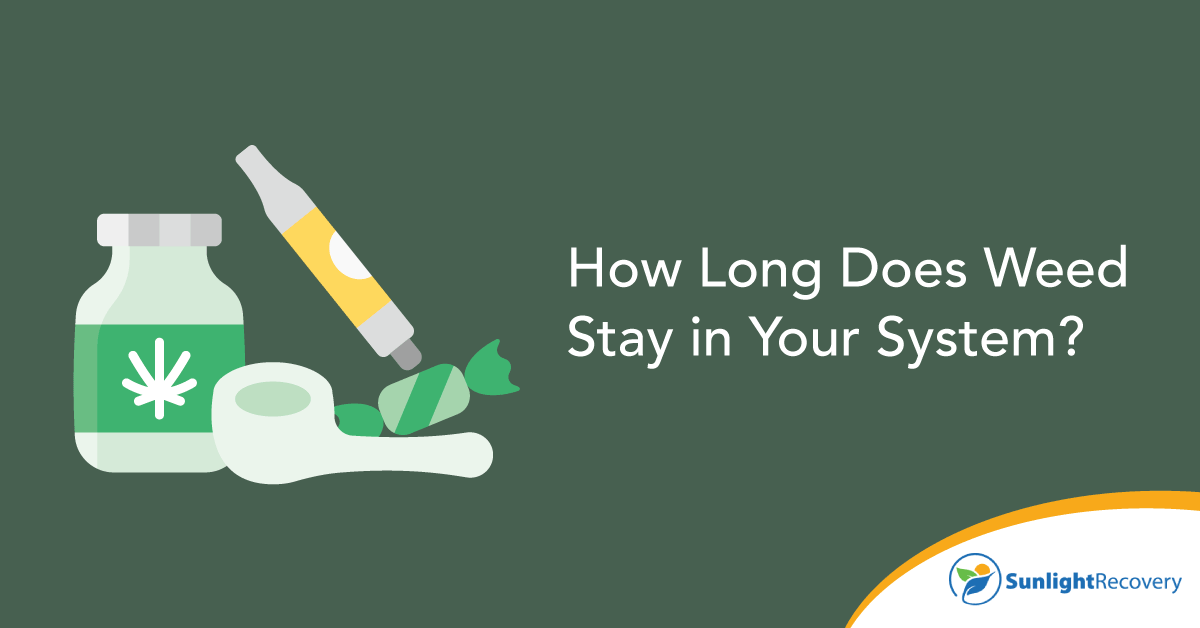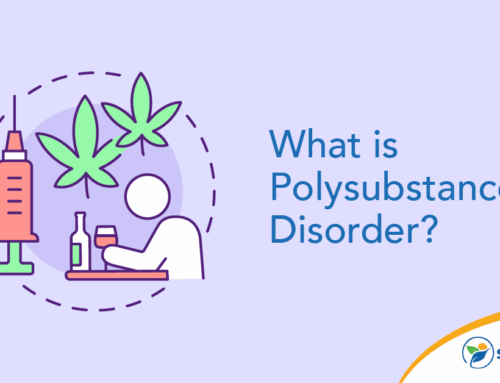There’s no doubt that marijuana usage has increased in recent years. Also known as cannabis, pot and weed, the drug remains illegal at the federal level. However, many states — and politicians — are pushing back against this. As of February 2024, 24 states and the District of Columbia have moved to legalize recreational marijuana use.
The increased popularity of cannabis has raised many questions, one of the most frequent being “How long does weed stay in your blood?” The answer depends on a wide range of factors, from the amount of THC consumed to how often you use the drug. There’s also a difference in how long weed stays in your blood compared to staying in urine or saliva.
Below, you can learn more about these factors and different methods used for cannabis testing. We’ll also share resources for those looking to reduce or eliminate their marijuana use and discuss how to get weed out of your system.
How Long Does Weed Stay in Your System?
Whether cannabis is ingested or smoked, THC first enters the bloodstream and begins to circulate throughout the body. From there, it’s metabolized in the liver. The liver begins breaking down THC into metabolites. Delta-9 THC and the first metabolite, 11-hydroxy-THC (OH-THC), have euphoric effects. This first metabolite is broken down further into many other metabolites that aren’t euphoric, meaning they don’t cause impairment or a “high.”
Many drug tests are designed to detect THC metabolites. However, the detection of non-euphoric metabolites doesn’t prove there’s any impairment. Urine tests only detect non-euphoric metabolites, which only prove recent marijuana use. You’d need a blood test within hours of THC exposure to demonstrate you might have been impaired.
Approximately 65% of metabolized cannabis is excreted through the bowels, while 20% is excreted through the kidneys into the urine. Five days after use, about 80% to 90% of the cannabis is gone from your system. This means about 10% to 20% of the metabolized THC still remains in your body.
How long does THC stay in your system? In general, metabolized THC can be detected in the body for more than a month after use. The exact answer can vary depending on factors such as:
- Body weight. Cannabis is stored in body fat, so those with higher body fat percentages may retain cannabis metabolites for longer periods of time.
- Method of ingestion. THC ingested through edibles usually remains in the system longer than THC inhaled through smoking.
- Hydration. Being dehydrated can cause THC metabolites to remain in your system longer.
- Amount of THC consumed. The higher the concentration of THC, the longer the metabolites will remain in your system.
- Frequency of marijuana use. Studies show that people who frequently use marijuana retain higher THC metabolite levels than infrequent users.
Ultimately, there’s no single answer when it comes to how long weed stays in your system. For those concerned about drug testing, the results will be highly dependent on the type of test taken.
What Factors Affect How Long Weed Stays in Your System?
First, you need to consider how often you use cannabis. If you’re a regular user, the drug metabolites can stay in your system for up to 90 days. If you’ve only taken THC occasionally, it’s probably out of your system within a week.
The type of test also influences the length of time THC remains detectable. Typically, drug tests look for the presence of a molecule called THC-COOH, the second metabolite produced. Most employers use urine tests, which show THC ingested within the last 24 to 72 hours. Saliva tests detect cannabis use from the past few hours up to 48 hours. Hair tests can show whether someone has used marijuana within the past 3 months.
Why Would You Need to Remove THC Quickly?
Even if you live in a state where cannabis has been legalized, you may need to pass a THC screening for jobs in certain industries, such as transportation. If you’re a young adult, you may have school or sports obligations that require a clean test. Perhaps you just want a fresh start, so you want to remove THC or other toxins from your system before you quit smoking, vaping or ingesting weed. Cannabis can negatively impact your life, even when it’s legal in your state. Some of the well-documented effects of THC abuse include:
- Challenges at work or school. You simply can’t perform up to your best ability if you’re often high. You might also start missing school and work due to the impacts of cannabis on your life, which further affects performance.
- Relationship struggles. This can include conflicts with family, friends, partners and loved ones. Often, overuse of marijuana results in loss of interest in the activities you used to enjoy.
- Financial difficulties. Cannabis can take a big chunk out of your budget, especially if you chronically partake in the plant. If you lose your job or run into other money issues, you could be in a world of trouble.
- Association with other bad habits. For example, you may tend to drink alcohol, use tobacco, gamble or participate in other risky behavior when you’re high on THC.
How Does Weed Affect the Body?
Before we discuss how long THC remains in the body, it’s important to understand its effects. Marijuana contains a chemical called delta-9-tetrahydrocannabinol (THC), which is known to cause relaxation and elation. It may also trigger the following symptoms:
- Fatigue
- Poor concentration and memory
- Slower reflexes
- Anxiety and fear
- Paranoia and confusion
- Increased heart rate
- Dry mouth
- Bloodshot eyes
There are two main ways THC enters your system: smoking and consuming edibles. When choosing a method, some people wonder how long THC stays in your system when it’s smoked compared to ingested as an edible. While there’s no specific answer, the two methods do produce different experiences.
Those who smoke cannabis may feel the effects within minutes, and these can persist for over 6 hours. Those who consume edibles, meanwhile, may not notice the effects for up to 2 hours. Once the effects kick in, they can last for over 12 hours.
Whether you smoke or consume edibles, the psychoactive effects usually don’t last very long. However, THC metabolites that are detectable with drug tests can linger in your body for weeks afterward.
Clearing Weed From Your System: Tips and Myths
If you’re wondering whether you can clear weed from your body to pass a blood test, it’s unlikely. There are ways to help your body process THC faster, such as staying properly hydrated or consuming low concentrations. You could also try speeding up your metabolism through exercise. However, none of these actions are 100% effective at preventing a drug test from detecting THC.
Ultimately, the only way to completely clear THC from your system is to avoid ingesting it in the first place. For some people, however, this is easier said than done, as long-term marijuana use can lead to both physical and psychological dependency. Known as marijuana use disorder, this dependency may result in the following symptoms:
- Consuming increasing levels of marijuana
- Struggling to reduce marijuana use
- Frequently craving marijuana
- Neglecting obligations to consume marijuana
- Experiencing discomfort after stopping marijuana use
If you or a loved one is exhibiting signs of marijuana use disorder, treatment can help.
Does Flushing THC Really Work?
A lot of myths circulate about the best way to get THC out of your system. You probably won’t see the results you’re looking for from a cranberry juice detox, for example. Although drinking a good amount of cranberry juice could help dilute your urine enough to pass that type of test, it won’t be any help if you need to pass a hair or saliva test. Over-the-counter detox teas, weed detox kits and products advertising a same-day detox don’t guarantee a clean drug test. These products aren’t regulated and are unlikely to do what they promise, especially if you need to pass a test quickly.
On the other hand, consider these tried-and-true techniques for flushing THC from the body:
- Physical activity. Exercise helps remove the substance from where it’s stored in your fat cells while increasing the body’s ability to produce natural endocannabinoids to regulate mood.
- Balanced nutrition, including lots of veggies. Greens, such as kale and spinach, increase metabolism, which supports the natural detox process. Healthy fibers, such as beans, legumes and whole grains, benefit the body as it metabolizes THC while helping stabilize mood.
- Herbal tea. Milk thistle and dandelion varieties help the liver detox the body, an essential part of removing residual cannabis. Green tea contains antioxidants, which also support the immune system in fighting off toxins.
- Discontinued use of the drug at least 30 days before your test. You’ll need to allow at least 90 days before you get a clean screen if you’re a daily cannabis user, so it helps to plan ahead.
- Moderate fluid intake. Aim for about eight 8-ounce glasses of water each day, and avoid sugary beverages like soda and juice.
- Relaxation techniques to balance the mood and reduce stress. Examples include yoga, meditation and breathing exercises.
Some strategies for flushing THC can harm your health. Don’t try to detox by using:
- High doses of niacin. This can cause vomiting, nausea, diarrhea, cramps and other unwanted symptoms.
- Gallons of water ingested over a short period of time (24 hours, for example). This method can lead to hyponatremia and low blood sodium levels that can be life-threatening.
- Apple cider vinegar detox. Like excessive water intake, drinking vinegar causes hyponatremia.
People may try to pass drug tests by adding cleaning fluid to their urine or even using synthetic urine. Most modern drug tests are designed to detect these attempts, and you could immediately fail or at minimum have to take the test again. In fact, even drinking too much water can result in the need to retest.
Overcoming a Marijuana Dependency
Marijuana may be illegal at the federal level, but that hasn’t stopped the substance from growing in popularity. As more states legalize recreational marijuana use, an increasing number of people are experimenting with the drug. However, many individuals don’t realize that THC can remain in their bodies for over 3 months. And more importantly, marijuana use can lead to drug dependency.
At Sunlight Recovery, we’re committed to helping people overcome substance use. In addition to inpatient treatment and medical detox, we offer therapy sessions designed to deliver emotional support. Our resources, combined with our team of licensed clinical and medical professionals, have helped many people regain control of their lives. Contact us today to learn more.







